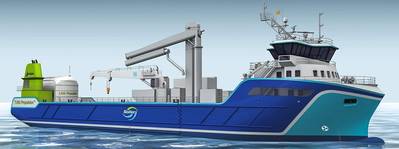Rolls-Royce inks $6.5 million deal to supply a LNG propulsion package for a newbuild fish food carrier vessel
Rolls-Royce has signed a $6.5 million contract with Tersan Shipyard in Turkey to supply a liquefied natural gas (LNG) propulsion package for a cargo carrier designed by NSK Ship Design for Norwegian ship owner NSK Shipping. The vessel will deliver fish food on behalf of BioMar Group.
The new cargo carrier will be a slightly larger sister ship to NSK Shipping’s MS Høydal which was the world’s first LNG powered cargo vessel and which was delivered from Tersan Shipyard in 2012. Both ships are designed by NSK Ship Design.
The 81.5-meter-long vessel will be able to carry 2,700 metric tons of fish food to fish farms along the Norwegian coast. The new cargo carrier is expected to be delivered from the yard in 2017.
The LNG Propulsion system comprises one eight-cylinder Bergen C26:33 natural gas engine rated at 2,160 kilowatts, Promas combined rudder and propeller system, one tunnel thruster in the bow and one in the aft, and a Rolls-Royce automation and dynamic positioning (DP) system.
The vessel is also equipped with the Rolls-Royce hybrid shaft generator (HSG) propulsion system, meaning the main engine also generates electricity for the ship. The HSG will generate electrical power for the ship even if the engine power output varies, saving fuel. The HSG can also act as a propulsion motor (PTI) providing an alternative power source should LNG becomes unavailable – a prerequisite for class approval.
Rolls-Royce said its Bergen Gas Engines the only pure gas engines on the market using a spark plug ignition. Alternative “dual fuel” engines use a small amount of diesel for ignition. The B and C Series engines emit around 22 percent (including methane slip) less carbon dioxide (CO2) per unit of power than a diesel engine and nitrogen oxide (NOx) emissions are reduced by 90 percent. Sulphur oxide (SOx) emissions are negligible. Bergen gas engines deliver a significant reduction in fuel and lubrication oil consumption. In addition, the clean, safe engine rooms and advanced technology can reduce maintenance costs as well as providing a more pleasant working environment for the crew.
BioMar has 11 factories producing fish food, in Norway, Chile, Denmark, Scotland, Spain, France, Greece, Turkey and Costa Rica.














